| Listing 1 - 10 of 15 | << page >> |
Sort by
|
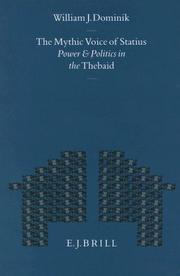
ISBN: 9004099727 9004329412 9789004099722 Year: 1994 Volume: 136 Publisher: Leiden Brill
Abstract | Keywords | Export | Availability | Bookmark
 Loading...
Loading...Choose an application
- Reference Manager
- EndNote
- RefWorks (Direct export to RefWorks)
This is the first thematic study of Statius' Thebaid to be published in monograph form in English in the past twenty years. It examines in detail the thematic design and intent of the Thebaid and considers the question of its contemporary relevance. The book focuses on the central theme of power — how it is exercised on the supernatural and human levels and the consequences of its pursuit and abuse in terms of the human condition. An ensuing discussion explores the political undercurrents of the epic. This discussion is in four main parts: (1) 'Use and Abuse of Supernatural Power'; (2) 'Pursuit and Abuse of Monarchal Power'; (3) 'Consequences of the Abuse of Power'; and (4) 'Political Relevance to Contemporary Rome'. The views expressed represent a fundamental departure from previous studies and constitute a critical reassessment of the Thebaid . The provision of translations makes the book accessible to the Latinless reader.
Statius, Publius Papinius --- Seven against Thebes (Greek mythology) in literature --- Political poetry, Latin --- Epic poetry, Latin --- Power (Social sciences) in literature --- Politics and literature --- Sept contre Thèbes (Mythologie grecque) dans la littérature --- Poésie politique latine --- Poésie épique latine --- Pouvoir (Sciences sociales) dans la littérature --- Politique et littérature --- History and criticism --- Histoire et critique --- Statius, P. Papinius --- Seven against Thebes (Greek mythology) in literature. --- Power (Social sciences) in literature. --- Sibling rivalry in literature. --- Polyneices (Greek mythology) --- Eteocles (Greek mythology) --- History and criticism. --- -Epic poetry, Latin --- -Power (Social sciences) in literature --- -Literature --- Literature and politics --- Literature --- Latin epic poetry --- Latin poetry --- Latin political poetry --- Political aspects --- Thebes (Greece) --- In literature. --- Publius Papinius Statius --- Statius, Papinius --- Stace --- -History and criticism --- Eteocles (Greek mythology). --- Polyneices (Greek mythology). --- Sept contre Thèbes (Mythologie grecque) dans la littérature --- Poésie politique latine --- Poésie épique latine --- Pouvoir (Sciences sociales) dans la littérature --- Politique et littérature --- Sibling rivalry in literature --- Thēvai (Greece) --- Thívai (Greece) --- Thebes (Greece : Ancient city) --- Thiva (Greece) --- Thēva (Greece) --- Tebe (Greece) --- Theben (Greece) --- Thebes (Greece : Extinct city) --- Θῆβαι (Greece) --- Thēbai (Greece) --- Θήβα (Greece) --- Epic poetry, Latin. --- Literature. --- Political poetry, Latin. --- Politics and literature. --- Belles-lettres --- Western literature (Western countries) --- World literature --- Philology --- Authors --- Authorship --- Polynices --- Eteocles, --- Polineikes --- Polinice --- Polinices --- Polinik --- Poliniko --- Polinizes --- Polyneices --- Polyneikēs --- Polynice --- Polynikes --- Étéocle, --- Eteoklēs, --- Eteoklo, --- Полінік --- ポリュネイケース --- פוליניקס --- 폴리네이케스 --- Полиник --- Палінік --- Πολυνείκης --- Thebais (Statius, P. Papinius) --- P. Papini Stati Thebaidos libri XII (Statius, P. Papinius) --- Thebaidos libri XII (Statius, P. Papinius) --- Tebaida (Statius, P. Papinius) --- Greece --- Rome (Empire) --- Byzantine Empire --- Italy --- Rim --- Roman Empire --- Roman Republic --- Rome --- Romi (Empire)
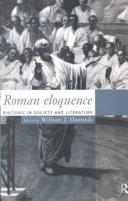
ISBN: 0415125456 0415125448 9780415125451 Year: 1997 Publisher: London Routledge
Abstract | Keywords | Export | Availability | Bookmark
 Loading...
Loading...Choose an application
- Reference Manager
- EndNote
- RefWorks (Direct export to RefWorks)
Rhetoric is once again becoming valued as an essential element in the exploration of the ancient world. This volume is part of a general renaissance in the study of rhetoric and draws together established and newer scholars in the field to produce a probing and innovative analysis of the role played by rhetoric in Roman culture. Utilizing a variety of critical approaches and methodologies, the contributors examine not only the role of rhetoric in Roman society but also the relationship between rhetoric and Rome's major literary genres. 'Roman' 'Eloquence' emphasizes the theory and practice of rhetoric in a variety of social, political and literary contexts, and reveals the important role played by rhetoric in the formation of the various genres of literatures.
Latin literature --- Literature and society --- Rhetoric, Ancient. --- History and criticism --- Theory, etc. --- Rome --- Social life and customs. --- Rhetoric, Ancient --- Ancient rhetoric --- Classical languages --- Greek language --- Greek rhetoric --- Latin language --- Latin rhetoric --- Roman literature --- Classical literature --- Classical philology --- Latin philology --- History and criticism&delete& --- Theory, etc --- Rhetoric --- Social life and customs --- Latin literature - History and criticism - Theory, etc. --- Literature and society - Rome.
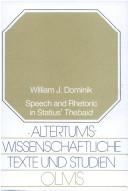
ISBN: 3487098148 9783487098142 Year: 1994 Volume: 27 Publisher: Hildesheim Olms
Abstract | Keywords | Export | Availability | Bookmark
 Loading...
Loading...Choose an application
- Reference Manager
- EndNote
- RefWorks (Direct export to RefWorks)
Seven against Thebes (Greek mythology) in literature. --- Rhetoric, Ancient. --- Speeches, addresses, etc., Latin --- Sibling rivalry in literature. --- Polyneices (Greek mythology) --- Eteocles (Greek mythology) --- Latin language --- History and criticism. --- Style. --- Rhetoric, Ancient --- Seven against Thebes (Greek mythology) in literature --- -Speeches, addresses, etc., Latin --- -Latin orations --- Latin speeches --- Classical languages --- Italic languages and dialects --- Classical philology --- Latin philology --- Greek language --- Greek rhetoric --- Latin rhetoric --- Style --- History and criticism --- Rhetoric --- Statius, P. Papinius --- -Literary style --- -Publius Papinius Statius --- Statius, Papinius --- Stace --- Literary style --- -Style --- -Classical languages --- Latin orations --- Ancient rhetoric --- Sibling rivalry in literature --- Estacio --- Statius, Publius Papinius --- Literary style. --- Thebes (Greece) --- Thēvai (Greece) --- Thívai (Greece) --- Thebes (Greece : Ancient city) --- Thiva (Greece) --- Thēva (Greece) --- Tebe (Greece) --- Theben (Greece) --- Thebes (Greece : Extinct city) --- Θῆβαι (Greece) --- Thēbai (Greece) --- Θήβα (Greece) --- In literature. --- Stat︠s︡iĭ, Publiĭ Papiniĭ --- Стаций, Публий Папиний --- Stazio --- Speeches, addresses, etc., Latin - History and criticism. --- Latin language - Style.

ISBN: 0865164851 9780865164857 Year: 2002 Publisher: Wauconda (Ill.): Bolchazy-Carducci,
Abstract | Keywords | Export | Availability | Bookmark
 Loading...
Loading...Choose an application
- Reference Manager
- EndNote
- RefWorks (Direct export to RefWorks)
Civilization, Classical. --- English language --- Etymology. --- Language and languages --- Civilization, Classical
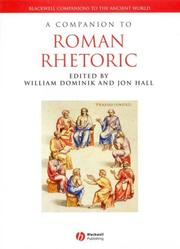
ISBN: 9781405120913 1405120916 1444334158 047099648X 9786610743582 1405185007 0470984295 1782684905 1280743581 1405171987 9781444334159 Year: 2007 Volume: *17 Publisher: Oxford Blackwell
Abstract | Keywords | Export | Availability | Bookmark
 Loading...
Loading...Choose an application
- Reference Manager
- EndNote
- RefWorks (Direct export to RefWorks)
Rhetoric, Ancient --- Ancient rhetoric --- Classical languages --- Greek language --- Greek rhetoric --- Latin language --- Latin rhetoric --- Rhetoric --- Classical Latin literature --- Literary rhetorics --- Rhetoric, Ancient. --- Rhetoric. --- Latin literature --- History and criticism --- Theory, etc. --- Discours latins --- Rhétorique antique --- Rhétorique antique
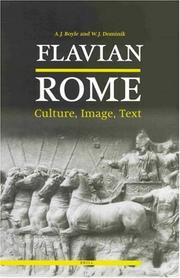
ISBN: 9004111883 9004217150 9789004111882 Year: 2003 Publisher: Leiden: Brill,
Abstract | Keywords | Export | Availability | Bookmark
 Loading...
Loading...Choose an application
- Reference Manager
- EndNote
- RefWorks (Direct export to RefWorks)
The politics, literature and culture of ancient Rome during the Flavian principate (69-96 ce) have recently been the subject of intense investigation. In this volume of new, specially commissioned studies, twenty-five scholars from five countries have combined to produce a critical survey of the period, which underscores and re-evaluates its foundational importance. Most of the authors are established international figures, but a feature of the volume is the presence of young, emerging scholars at the cutting edge of the discipline. The studies attend to a diversity of topics, including: the new political settlement, the role of the army, change and continuity in Rome’s social structures, cultural festivals, architecture, sculpture, religion, coinage, imperial discourse, epistemology and political control, rhetoric, philosophy, Greek intellectual life, drama, poetry, patronage, Flavian historians, amphitheatrical Rome. All Greek and Latin text is translated.
Rome --- History --- Histoire --- Flavians, 69-96 --- 69 - 96 --- Flavians, Reign of (Rome) --- Rome (Empire) --- Rim --- Roman Empire --- Roman Republic --- Romi (Empire) --- Byzantine Empire --- Italy --- Rome - History - Flavians, 69-96

ISBN: 3631368372 Year: 2003 Publisher: Frankfurt am Main ; Berlin ; Bern Peter Lang
Abstract | Keywords | Export | Availability | Bookmark
 Loading...
Loading...Choose an application
- Reference Manager
- EndNote
- RefWorks (Direct export to RefWorks)

ISBN: 3487105675 9783487105673 Year: 1997 Volume: 166 Publisher: Hildesheim Zürich New York Olms-Weidmann
Abstract | Keywords | Export | Availability | Bookmark
 Loading...
Loading...Choose an application
- Reference Manager
- EndNote
- RefWorks (Direct export to RefWorks)
Latin language --- Latin (Langue) --- Glossaries, vocabularies, etc. --- Glossaires, vocabulaires, etc --- Sidonius Apollinaris, --- Glossaires, vocabulaires,etc
Book
ISBN: 9789004156715 9004156712 9004217134 Year: 2009 Volume: *3 Publisher: Leiden Boston : Brill,
Abstract | Keywords | Export | Availability | Bookmark
 Loading...
Loading...Choose an application
- Reference Manager
- EndNote
- RefWorks (Direct export to RefWorks)
Roman literature is inherently political in the varied contexts of its production and the abiding concerns of its subject matter. This collection examines the strategies and techniques of political writing at Rome in a broad range of literature spanning almost two centuries, differing political systems, climates, and contexts. It applies a definition of politics that is more in keeping with modern critical approaches than has often been the case in studies of the political literature of classical antiquity. By applying a wide variety of critically informed viewpoints, this volume offers the reader not only a long view of the abiding techniques, strategies, and concerns of political expression at Rome but also many new perspectives on individual authors of the early empire and their republican precursors.
Latin literature --- Political science --- Politics and literature --- Politics in literature. --- History and criticism. --- History. --- Rome --- Politics and government. --- Latin literature. --- Political science. --- Politics and literature. --- Political science in literature --- Literature and politics --- Literature --- Civil government --- Commonwealth, The --- Government --- Political theory --- Political thought --- Politics --- Science, Political --- Social sciences --- State, The --- Roman literature --- Classical philology --- Latin philology --- Political aspects --- Rome (Empire) --- Rim --- Roman Empire --- Roman Republic --- Romi (Empire) --- Byzantine Empire --- Italy --- Classical literature --- Littérature latine --- Politique et littérature --- Science politique --- Histoire et critique --- Politique et gouvernement --- Littérature latine --- Politique et littérature
Book
ISSN: 18723357 ISBN: 9004284702 9789004284708 9789004217898 9004217894 Year: 2015 Publisher: Leiden Brill
Abstract | Keywords | Export | Availability | Bookmark
 Loading...
Loading...Choose an application
- Reference Manager
- EndNote
- RefWorks (Direct export to RefWorks)
Brill’s Companion to Statius is the first companion volume to be published on arguably the most important Roman poet of the Flavian period. Thirty-four newly commissioned chapters from international experts provide a comprehensive overview of recent approaches to Statius, discuss the fundamental issues and themes of his poetry, and suggest new fruitful areas for research. All of his works are considered: the Thebaid , his longest extant epic; the Achilleid , his unfinished epic; and the Silvae , his collected short poetry. Particular themes explored include the social, cultural, and political issues surrounding his poetry; his controversial aesthetic; the influence of his predecessors upon his poetry; and the scholarly and literary reception of his poetry in subsequent ages to the present.
Statius, P. Papinius --- Estacio --- Stace --- Statius, Papinius --- Statius, Publius Papinius --- Stat︠s︡iĭ, Publiĭ Papiniĭ --- Стаций, Публий Папиний --- Criticism and interpretation. --- Stazio --- Littérature latine --- Critique et interprétation. --- Stace, --- Stace (0040?-0096). --- Statius, P. Papinius. --- Statius, Publius Papinius, --- Statius, Publius Papinius. --- Epic poetry, Latin --- History and criticism --- Criticism and interpretation --- Statius, P. Papinius - (Publius Papinius) - Criticism and interpretation --- Statius, P. Papinius - (Publius Papinius)
| Listing 1 - 10 of 15 | << page >> |
Sort by
|

 Search
Search Feedback
Feedback About UniCat
About UniCat  Help
Help News
News